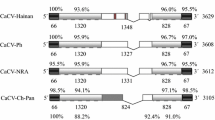Summary.
Chandipura virus (CHPV) and Isfahan virus (ISFV) are two members of the genus Vesiculovirus from Asia. Both are arthropod-transmitted and are able to infect humans, but neither causes vesicular stomatitis in livestock. The complete genome sequence for each virus has been determined. The negative-sense RNA genome comprises 11,119 nt (CHPV) or 11,088 nt (ISFV). The most variable of the non-transcribed regions is the intergenic spacer at the G–L gene junction (4 bases in ISFV, 20 in CHPV). Phylogenetic analysis of deduced protein sequences shows that although CHPV and ISFV are distinct viruses, they are more related to each other than either is to the New World vesicular stomatitis viruses (VSV). The South American virus, Piry virus, is more closely related to the Asian viruses ISFV and CHPV, than it is to VSV.
Similar content being viewed by others
Author information
Authors and Affiliations
Rights and permissions
About this article
Cite this article
Marriott, A. Complete genome sequences of Chandipura and Isfahan vesiculoviruses. Arch Virol 150, 671–680 (2005). https://doi.org/10.1007/s00705-004-0452-2
Received:
Accepted:
Published:
Issue Date:
DOI: https://doi.org/10.1007/s00705-004-0452-2




